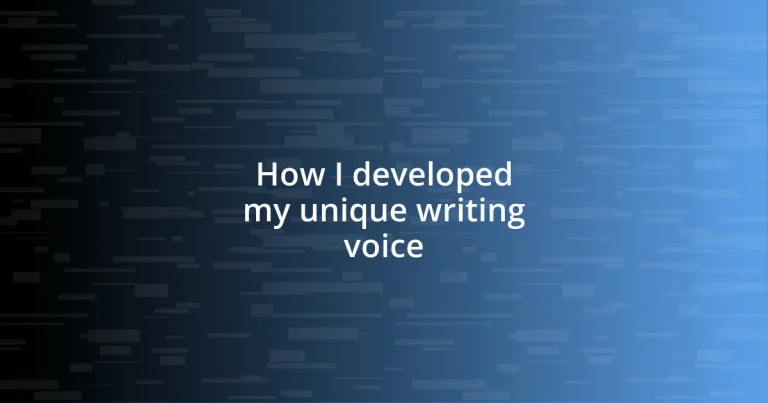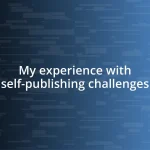Key takeaways:
- Finding one’s unique writing voice involves embracing vulnerability and authenticity, allowing deeper connections with readers.
- Consistent writing practice and peer feedback play crucial roles in refining and enhancing a writer’s voice and creativity.
- Revision is essential for discovering and expressing the true essence of one’s writing, transforming initial drafts into powerful narratives.
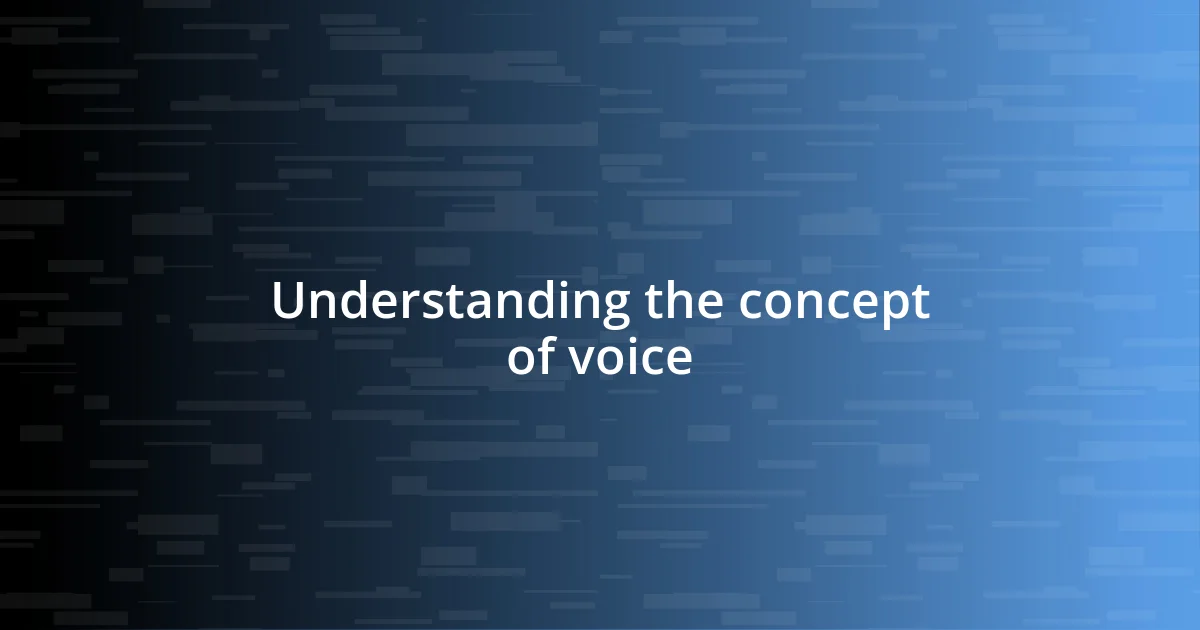
Understanding the concept of voice
Voice in writing is more than just a stylistic choice; it’s an authentic expression of who we are as individuals. When I first began writing, I often struggled to find my unique voice, feeling like I was imitating others. Have you ever felt that way? It can be quite a journey to strip away those influences and uncover your true self on the page.
As I honed my skills, I realized that my voice encompasses my thoughts, emotions, and experiences. I remember a rainy afternoon spent scribbling in my journal, pouring out my feelings about a recent heartache. The words flowed with raw honesty, and I sensed that this genuine emotion was what made my writing resonate with others. It taught me that embracing vulnerability allows the reader to connect in a deeper, more meaningful way.
Understanding voice also means recognizing the rhythm and tone that come naturally to us. I find that incorporating a conversational style—like I’m chatting with a friend—allows my personality to shine through. Sometimes I wonder, why do we hesitate to be ourselves? In my experience, the more I’ve embraced that authenticity, the more confident and distinct my voice has become, inviting readers into my world.
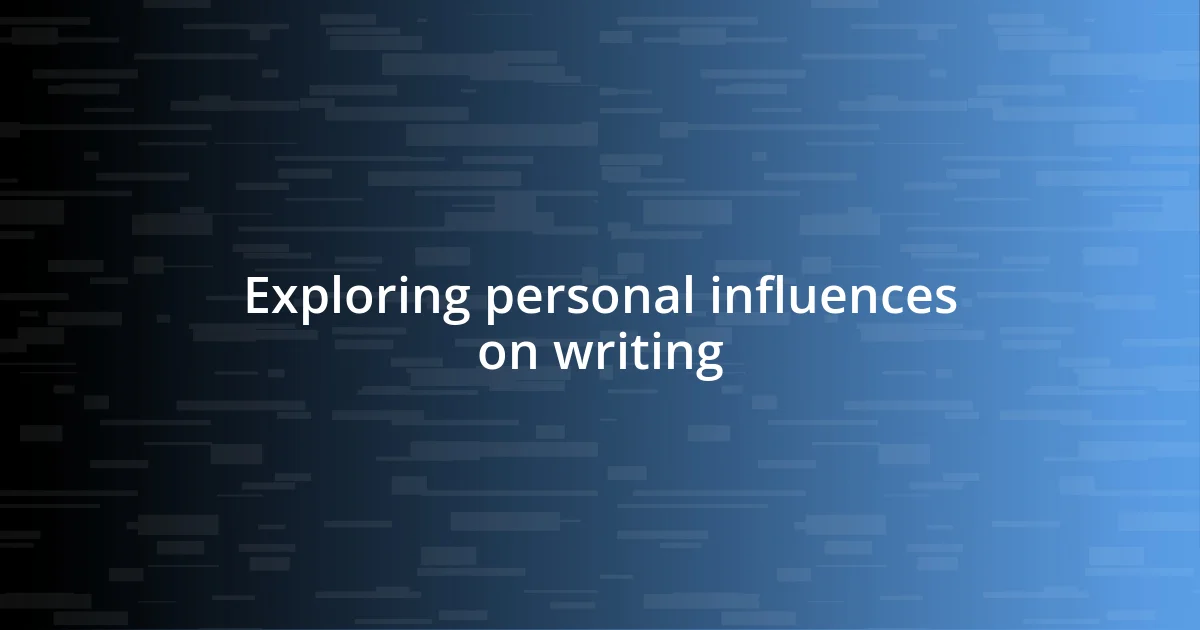
Exploring personal influences on writing
When reflecting on my writing journey, I can’t overlook the personal influences that have shaped my voice. My family’s storytelling traditions instilled in me the rhythm and warmth of narrative. I vividly remember sitting around the dinner table, where my grandmother would weave tales from her past with such vibrancy and detail that they would leap to life. Those moments taught me the power of personal history and the importance of infusing storytelling with emotional depth—lessons I’ve carried into my own writing.
- Family storytelling traditions.
- Influences from favorite authors.
- Conversations with friends and their perspectives.
- Personal experiences and challenges.
- Cultural background and heritage.
These influences were like stepping stones, providing me with a solid foundation to explore my own uniqueness. Every situation or person I’ve encountered has added a layer to my voice, pushing me to articulate my thoughts and experiences more vividly. I remember one late-night brainstorming session with a friend, where we shared our wildest dreams and deepest fears. That exchange sparked a surge of creativity within me, demonstrating how conversation can sculpt our writing journey. Quite honestly, I believe that diving into these personal connections has not only enriched my narrative style but allowed me to write with authentic passion.

Analyzing different writing styles
When analyzing different writing styles, I find it fascinating how each one reflects a unique approach to storytelling. For instance, some writers adopt a formal tone, which often conveys authority and expertise. In contrast, others prefer a casual voice that invites readers in, making it feel like a friendly chat. I remember reading a novel that effortlessly blended humor with profound insights, leaving me inspired to experiment with my own style.
Another key aspect to consider is how sentence structure can influence the rhythm of writing. Short, punchy sentences can create urgency, while longer, more complex sentences often allow for deeper reflection. I once tried mimicking a friend’s lyrical prose, and though it was a fun exercise, I quickly realized that it felt forced and didn’t suit my natural voice. It took time to appreciate the power of authenticity in writing.
Ultimately, recognizing how different styles serve distinct purposes helps us navigate our own voice. Some writers channel emotional resilience through poetic flair, while others engage through relatable anecdotes. I can’t help but wonder about the experiences behind those styles. Reflecting on my own encounters, I see how my evolving journey fueled my writing, shaping the essence of what I’ve crafted today.
| Writing Style | Characteristics |
|---|---|
| Formal | Authoritative, structured, often complex |
| Casual | Conversational, engaging, relatable |
| Lyrical | Flowing, poetic, emotional depth |
| Concise | Direct, impactful, often urgent |
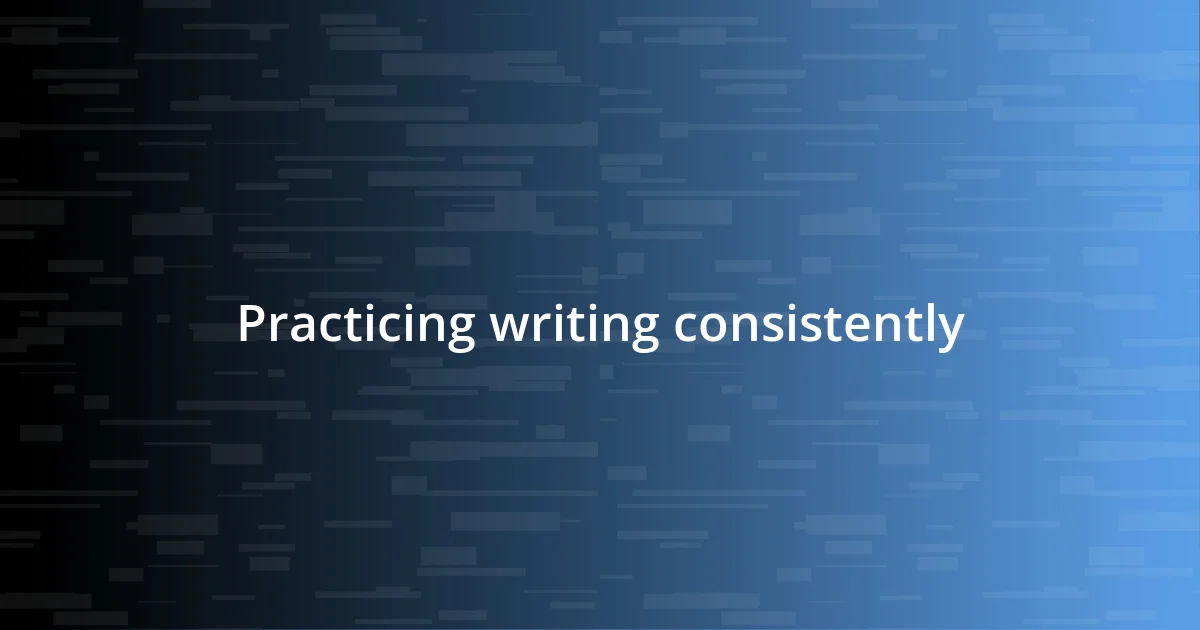
Practicing writing consistently
I’ve come to realize that consistent writing practice is like a muscle; the more I use it, the stronger it becomes. When I set aside time each day to write, even if it’s just a few paragraphs, I notice a significant improvement in my clarity and creativity. There was a period where I committed to journaling my thoughts every morning. This simple act transformed my writing, helping me discover new dimensions in my voice that I hadn’t previously tapped into.
It’s easy to feel overwhelmed by the idea of writing consistently. I remember a time when I struggled to find my rhythm, often staring at a blank page without knowing where to start. But over time, I learned that it didn’t need to be perfect; it just needed to happen. Those sloppy drafts from late-night writing sessions became stepping stones to more cohesive pieces. I wonder how many of you have felt that pressure to be flawless right from the beginning. Trust me, it’s through these rough drafts that my unique voice began to emerge.
I often reflect on my friend’s advice: “Just show up and write.” That simple mantra pushed me to consistently engage with my craft. On occasions when I looked back at my earlier pieces, I felt a mixture of embarrassment and pride. It’s interesting how our earlier work can feel so raw and unpolished yet showcases the growth we’ve undergone. Each piece I penned has been a snapshot of my journey, reminding me that consistency not only strengthens my skill but also allows my voice to evolve authentically.

Seeking feedback from peers
Seeking feedback from peers has been a crucial part of my writing journey. I remember the first time I shared a short story with a writing group. Their insights opened my eyes to nuances I had overlooked. It’s remarkable how others can spot the strengths and weaknesses in our work, often pointing out things we’re too close to see ourselves. Have you ever received feedback that completely changed your perspective? It can be a humbling yet rewarding experience.
Building trust within a group has made me more open to critique. I once hesitated to share a personal piece, fearing judgment. To my surprise, my peers resonated with my vulnerability, encouraging me to embrace that aspect of my writing. Their camaraderie showed me that constructive criticism isn’t just about fixing flaws; it’s also about celebrating what makes our voice unique. I learned that an open heart leads to richer discussions and deeper connections.
Despite feeling apprehensive at times, I’ve found that consistent feedback helps refine my voice. The dialogue with my peers ignites a spark of creativity I didn’t know I had. Sometimes, I ask myself: what if I had kept my work to myself? By sharing, I not only grow as a writer but also inspire others to do the same. Overall, I genuinely believe that seeking feedback from peers is like having a trusted compass guiding me toward my authentic writing voice.
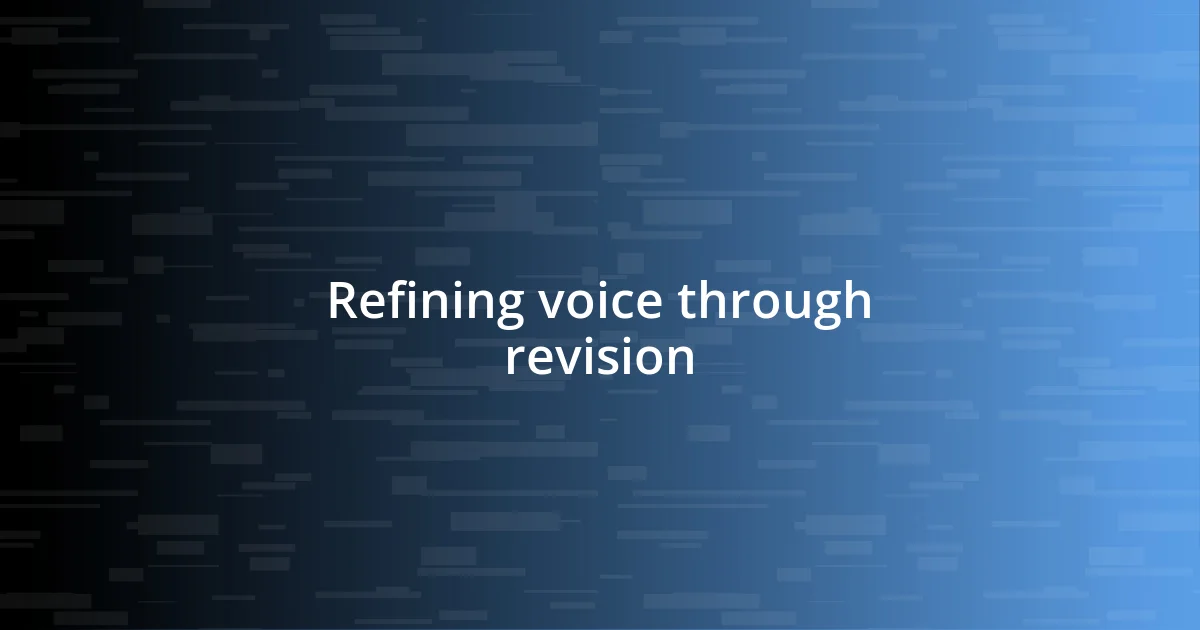
Refining voice through revision
Refining my voice through revision has been a journey filled with revelations. I recall a particular essay that initially felt almost lifeless. After revisiting it several times, I began to peel back layers of sentiment and clarity, and I discovered a rhythm I didn’t know existed. Isn’t it fascinating how words can transform through simple edits? That’s where the magic really happens.
I vividly remember a night spent revising a personal narrative; I was restless, surrounded by crumpled papers and a half-empty coffee cup. I kept slashing sentences that felt flat and instead focused on the raw emotions behind them. Each cut deepened my connection to the story, allowing my genuine voice to shine through. Have you ever felt that thrill when your writing finally captures your true essence? For me, it was through those late-night revisions that I began to understand not just what I wanted to say, but how I wanted to say it.
The process of revision can be daunting, yet it is essential for honing that unique voice. I sometimes feel like a sculptor chiseling away at a block of marble—it’s not just about removing excess material but about revealing the true form beneath. When I approach my drafts with this mindset, I let go of the fear of imperfection and embrace the journey of discovery. How many of us have hesitated to revise, thinking it might ruin the original spark? I’ve learned that with each revision, I’m not just rewriting; I’m redefining who I am as a writer.
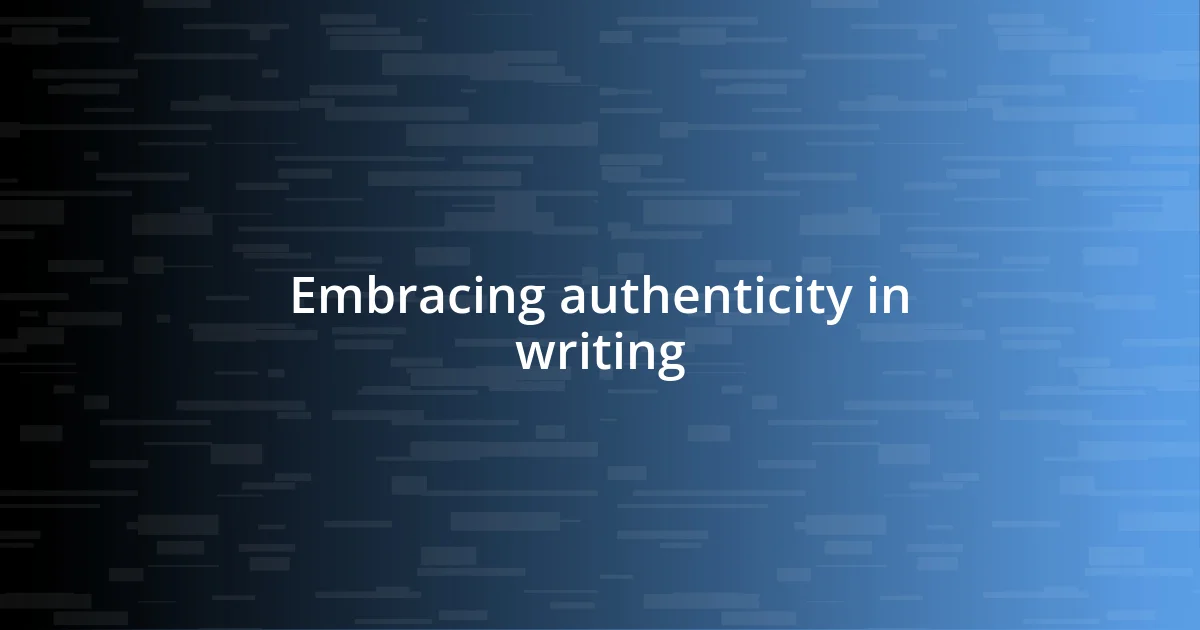
Embracing authenticity in writing
Embracing authenticity in writing revolves around tapping into my true self, which I’ve found both exhilarating and daunting. There was a time when I tried to mimic the styles of authors I admired, thinking it would make my writing stronger. But then I stumbled upon a journal entry where I poured my heart out, completely unfiltered. Reading it felt like a breath of fresh air. Have you ever had that experience where your own words resonate more deeply than anything you’ve tried to craft? That’s when it hit me—authenticity isn’t just a style; it’s an essence.
I recall a moment during a writing retreat when I shared a piece that was raw and deeply personal. The silence that followed was almost deafening, and I held my breath, unsure of what to expect. But instead of criticism, my peers offered tears, laughter, and stories of their own. It was an eye-opener! I realized then that vulnerability is a bridge to connection. When we write honestly, we allow readers to see themselves in our experiences. That little act of bravery can make all the difference, wouldn’t you agree?
What’s compelling about embracing authenticity is that it invites imperfection into our narratives. I used to shy away from sharing stories that had rough edges, fearing they wouldn’t be “good enough.” Yet, I’ve come to cherish those imperfections as they enrich the tapestry of my voice. I vividly remember writing a piece that included an embarrassing moment from my past. Instead of recoiling, I shared it, and it sparked laughter and camaraderie among others. Isn’t it liberating to realize that our flaws can be our greatest assets? Embracing authenticity has taught me that it’s in our realness where we truly shine as writers.












